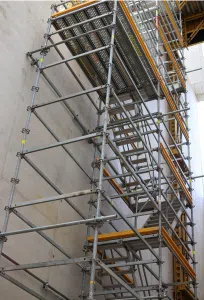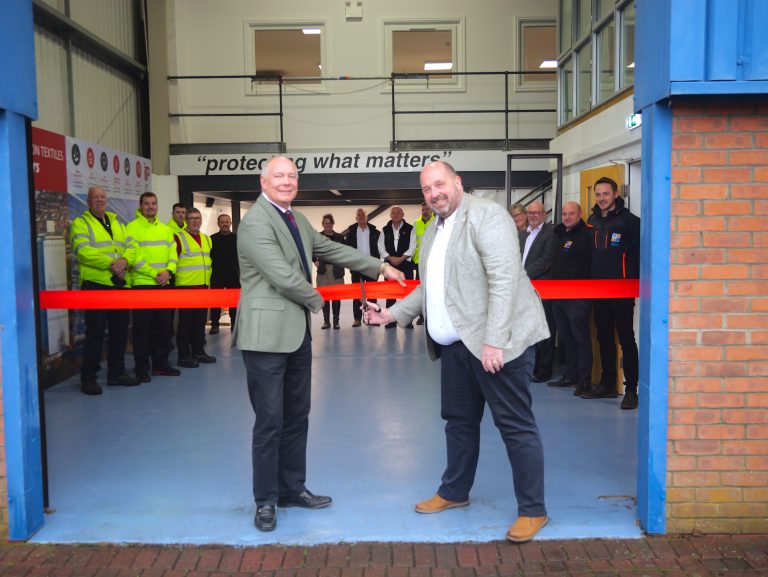Scaffmag is expanding into the United States through a strategic multi-year partnership with the Scaffold & Access Industry Association to produce SA Magazine from 2026.
The agreement marks Scaffmag’s first formal entry into the American market and will see the publisher deliver full editorial, design and production services for SAIA’s bi-monthly publication whilst the association retains ownership and strategic direction.
SA Magazine will relaunch with a modern design in both print and digital formats, featuring content focused on safety standards, regulatory updates, emerging technologies, training insights and international best practices across the scaffolding and access sector.
The partnership combines SAIA’s position as America’s leading scaffolding and access industry association with Scaffmag’s established international readership of more than 328,000 across Europe, 40,000-plus in North America, and growing audiences in Australia and New Zealand.
Mike Bredl, president of SAIA, said the collaboration positions SA Magazine as a leading international authority for scaffolding and access innovation.
“This relaunch reflects our commitment to elevating industry knowledge, expanding global connections, and providing meaningful value to our members and partners,” he said.
Daniel Norton, editor of Scaffmag, said: “This partnership represents an exciting opportunity to support SAIA and the American scaffolding industry whilst strengthening connections across the international access sector. We’re looking forward to working with SAIA to deliver a publication that serves the needs of scaffolding professionals on both sides of the Atlantic.”
Norton will take on the role of editor for SA Magazine as part of the agreement. Scaffmag Magazine will continue to publish as normal in the UK alongside the new venture.



 The system’s inherent levelness also removes the need for specialist inspectors to check every flight, saving considerable time. PERI UK provided full temporary works designs for the stair towers, transferring liability for structural stability from the contractor to the supplier.
For the ground floor, the team used the BECOSTOP permanent stop end system to segment the massive 20m x 20m concrete slab into manageable pours. The bespoke solution arrives on site ready-made, eliminating the labour-intensive cutting and propping required with traditional timber and ply methods.
“With our BECOSTOP system, erection is much quicker. Crucially, it’s left in position after the pour, unlike traditional methods where everything has to be removed,” said Kee.
William Griffith, project engineer at Careys, highlighted the safety advantages: “Due to the reinforcement detailing and the reinforcement projecting so far past the stop ends there was also a safety benefit in the use of BECOSTOP due to not having operatives getting beneath the projecting reinforcement and in some cases into the reinforcement cage to strike a typical stop end in this scenario.”
The structure, which extends from 6m below ground to 30m above, is now nearing structural completion. The concrete shell work for Careys lasted approximately 12 months.
The project demonstrates how modern, engineered systems can deliver measurable improvements in speed, safety and quality over conventional construction methods on complex industrial builds.
The system’s inherent levelness also removes the need for specialist inspectors to check every flight, saving considerable time. PERI UK provided full temporary works designs for the stair towers, transferring liability for structural stability from the contractor to the supplier.
For the ground floor, the team used the BECOSTOP permanent stop end system to segment the massive 20m x 20m concrete slab into manageable pours. The bespoke solution arrives on site ready-made, eliminating the labour-intensive cutting and propping required with traditional timber and ply methods.
“With our BECOSTOP system, erection is much quicker. Crucially, it’s left in position after the pour, unlike traditional methods where everything has to be removed,” said Kee.
William Griffith, project engineer at Careys, highlighted the safety advantages: “Due to the reinforcement detailing and the reinforcement projecting so far past the stop ends there was also a safety benefit in the use of BECOSTOP due to not having operatives getting beneath the projecting reinforcement and in some cases into the reinforcement cage to strike a typical stop end in this scenario.”
The structure, which extends from 6m below ground to 30m above, is now nearing structural completion. The concrete shell work for Careys lasted approximately 12 months.
The project demonstrates how modern, engineered systems can deliver measurable improvements in speed, safety and quality over conventional construction methods on complex industrial builds. 

 Jatinder Sharma CBE DL, Principal and Chief Executive of Walsall College, said the partnership ensures the college keeps pace with modern scaffolding practice. “This collaboration will ensure our scaffolding training remains cutting-edge and relevant, promoting efficiency, versatility and safety.
By working with AT-PAC, employers and their teams will gain new skills and confidence, which will strengthen relationships with their customers and suppliers.”
The alliance marks the third year of sustained growth for Construction College Midlands.
In 2023 it opened a
Jatinder Sharma CBE DL, Principal and Chief Executive of Walsall College, said the partnership ensures the college keeps pace with modern scaffolding practice. “This collaboration will ensure our scaffolding training remains cutting-edge and relevant, promoting efficiency, versatility and safety.
By working with AT-PAC, employers and their teams will gain new skills and confidence, which will strengthen relationships with their customers and suppliers.”
The alliance marks the third year of sustained growth for Construction College Midlands.
In 2023 it opened a 
 Councillor Leah Kirkpatrick, Mayor of Antrim and Newtownabbey, said the academy has been shaped around local industry needs. “This innovative training academy offers a real opportunity for local people to gain the skills and confidence needed to enter the construction industry,” she said. She noted that employers across the area continue to face shortages in key roles, particularly in scaffolding.
Councillor Leah Kirkpatrick, Mayor of Antrim and Newtownabbey, said the academy has been shaped around local industry needs. “This innovative training academy offers a real opportunity for local people to gain the skills and confidence needed to enter the construction industry,” she said. She noted that employers across the area continue to face shortages in key roles, particularly in scaffolding.




 For Alimak, the partnership adds further technical depth to its existing offer. The company already supplies a broad portfolio of hoists, mast climbers and transport platforms, backed by its connected management platform, My Alimak.
The system gives users real-time equipment diagnostics, asset tracking, BIM integration and safety tools to help maintain uptime across large fleets.
Cameron Reid, Sales Director at Alimak Group’s Construction Division, said the agreement formalises a long-standing relationship. “Alimak Group and CAS have a long history of working together,” he said.
“This agreement reflects our continued commitment to safe, efficient vertical access and outstanding customer service in high-rise construction.”
Both organisations say the partnership strengthens their ability to support large-scale projects, from towers to data centres, with a coordinated system that combines design expertise and global service capability.
For Alimak, the partnership adds further technical depth to its existing offer. The company already supplies a broad portfolio of hoists, mast climbers and transport platforms, backed by its connected management platform, My Alimak.
The system gives users real-time equipment diagnostics, asset tracking, BIM integration and safety tools to help maintain uptime across large fleets.
Cameron Reid, Sales Director at Alimak Group’s Construction Division, said the agreement formalises a long-standing relationship. “Alimak Group and CAS have a long history of working together,” he said.
“This agreement reflects our continued commitment to safe, efficient vertical access and outstanding customer service in high-rise construction.”
Both organisations say the partnership strengthens their ability to support large-scale projects, from towers to data centres, with a coordinated system that combines design expertise and global service capability.



